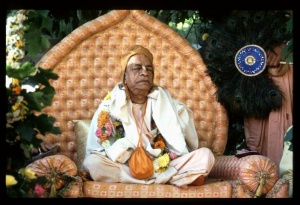BG 1.37-38: Difference between revisions
(Vanibot #0020 edit - link to the Version Compare feature) |
(Vanibot #0054 edit - transform synonyms into clickable links, which search similar occurrences) |
||
| Line 29: | Line 29: | ||
<div class="synonyms"> | <div class="synonyms"> | ||
''yadi'' | ''[//vanipedia.org/wiki/Special:VaniSearch?s=yadi&tab=syno_o&ds=1 yadi]'' — if; ''[//vanipedia.org/wiki/Special:VaniSearch?s=api&tab=syno_o&ds=1 api]'' — even; ''[//vanipedia.org/wiki/Special:VaniSearch?s=ete&tab=syno_o&ds=1 ete]'' — they; ''[//vanipedia.org/wiki/Special:VaniSearch?s=na&tab=syno_o&ds=1 na]'' — do not; ''[//vanipedia.org/wiki/Special:VaniSearch?s=paśyanti&tab=syno_o&ds=1 paśyanti]'' — see; ''[//vanipedia.org/wiki/Special:VaniSearch?s=lobha&tab=syno_o&ds=1 lobha]'' — by greed; ''[//vanipedia.org/wiki/Special:VaniSearch?s=upahata&tab=syno_o&ds=1 upahata]'' — overpowered; ''[//vanipedia.org/wiki/Special:VaniSearch?s=cetasaḥ&tab=syno_o&ds=1 cetasaḥ]'' — their hearts; ''[//vanipedia.org/wiki/Special:VaniSearch?s=kula&tab=syno_o&ds=1 kula]-[//vanipedia.org/wiki/Special:VaniSearch?s=kṣaya&tab=syno_o&ds=1 kṣaya]'' — in killing the family; ''[//vanipedia.org/wiki/Special:VaniSearch?s=kṛtam&tab=syno_o&ds=1 kṛtam]'' — done; ''[//vanipedia.org/wiki/Special:VaniSearch?s=doṣam&tab=syno_o&ds=1 doṣam]'' — fault; ''[//vanipedia.org/wiki/Special:VaniSearch?s=mitra&tab=syno_o&ds=1 mitra]-[//vanipedia.org/wiki/Special:VaniSearch?s=drohe&tab=syno_o&ds=1 drohe]'' — in quarreling with friends; ''[//vanipedia.org/wiki/Special:VaniSearch?s=ca&tab=syno_o&ds=1 ca]'' — also; ''[//vanipedia.org/wiki/Special:VaniSearch?s=pātakam&tab=syno_o&ds=1 pātakam]'' — sinful reactions; ''[//vanipedia.org/wiki/Special:VaniSearch?s=katham&tab=syno_o&ds=1 katham]'' — why; ''[//vanipedia.org/wiki/Special:VaniSearch?s=na&tab=syno_o&ds=1 na]'' — should not; ''[//vanipedia.org/wiki/Special:VaniSearch?s=jñeyam&tab=syno_o&ds=1 jñeyam]'' — be known; ''[//vanipedia.org/wiki/Special:VaniSearch?s=asmābhiḥ&tab=syno_o&ds=1 asmābhiḥ]'' — by us; ''[//vanipedia.org/wiki/Special:VaniSearch?s=pāpāt&tab=syno_o&ds=1 pāpāt]'' — from sins; ''[//vanipedia.org/wiki/Special:VaniSearch?s=asmāt&tab=syno_o&ds=1 asmāt]'' — these; ''[//vanipedia.org/wiki/Special:VaniSearch?s=nivartitum&tab=syno_o&ds=1 nivartitum]'' — to cease; ''[//vanipedia.org/wiki/Special:VaniSearch?s=kula&tab=syno_o&ds=1 kula]-[//vanipedia.org/wiki/Special:VaniSearch?s=kṣaya&tab=syno_o&ds=1 kṣaya]'' — in the destruction of a dynasty; ''[//vanipedia.org/wiki/Special:VaniSearch?s=kṛtam&tab=syno_o&ds=1 kṛtam]'' — done; ''[//vanipedia.org/wiki/Special:VaniSearch?s=doṣam&tab=syno_o&ds=1 doṣam]'' — crime; ''[//vanipedia.org/wiki/Special:VaniSearch?s=prapaśyadbhiḥ&tab=syno_o&ds=1 prapaśyadbhiḥ]'' — by those who can see; ''[//vanipedia.org/wiki/Special:VaniSearch?s=janārdana&tab=syno_o&ds=1 janārdana]'' — O Kṛṣṇa. | ||
</div> | </div> | ||
Latest revision as of 15:14, 17 February 2024

A.C. Bhaktivedanta Swami Prabhupada
TEXTS 37-38
- यद्यप्येते न पश्यन्ति लोभोपहतचेतसः ।
- कुलक्षयकृतं दोषं मित्रद्रोहे च पातकम् ॥३७॥
- कथं न ज्ञेयमस्माभिः पापादस्मान्निवर्तितुम् ।
- कुलक्षयकृतं दोषं प्रपश्यद्भिर्जनार्दन ॥३८॥
- yady apy ete na paśyanti
- lobhopahata-cetasaḥ
- kula-kṣaya-kṛtaṁ doṣaṁ
- mitra-drohe ca pātakam
- kathaṁ na jñeyam asmābhiḥ
- pāpād asmān nivartitum
- kula-kṣaya-kṛtaṁ doṣaṁ
- prapaśyadbhir janārdana
SYNONYMS
yadi — if; api — even; ete — they; na — do not; paśyanti — see; lobha — by greed; upahata — overpowered; cetasaḥ — their hearts; kula-kṣaya — in killing the family; kṛtam — done; doṣam — fault; mitra-drohe — in quarreling with friends; ca — also; pātakam — sinful reactions; katham — why; na — should not; jñeyam — be known; asmābhiḥ — by us; pāpāt — from sins; asmāt — these; nivartitum — to cease; kula-kṣaya — in the destruction of a dynasty; kṛtam — done; doṣam — crime; prapaśyadbhiḥ — by those who can see; janārdana — O Kṛṣṇa.
TRANSLATION
O Janārdana, although these men, their hearts overtaken by greed, see no fault in killing one's family or quarreling with friends, why should we, who can see the crime in destroying a family, engage in these acts of sin?
PURPORT
A kṣatriya is not supposed to refuse to battle or gamble when he is so invited by some rival party. Under such an obligation, Arjuna could not refuse to fight, because he had been challenged by the party of Duryodhana. In this connection, Arjuna considered that the other party might be blind to the effects of such a challenge. Arjuna, however, could see the evil consequences and could not accept the challenge. Obligation is actually binding when the effect is good, but when the effect is otherwise, then no one can be bound. Considering all these pros and cons, Arjuna decided not to fight.